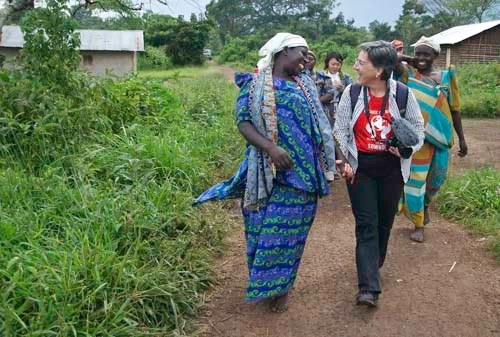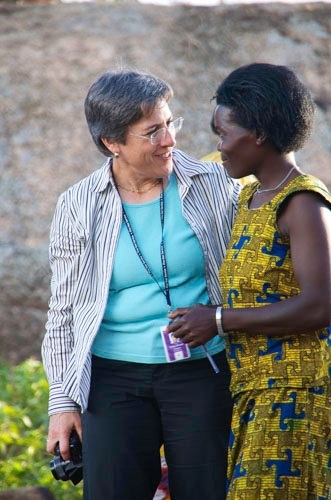A seat at the table
Breaking the poverty cycle for the world's poorest women
It wasn’t until dinner was served that Mary Dailey Brown realized the women she saw preparing the food earlier in the day wouldn’t be joining her. She learned they weren’t allowed to eat at the table with the men and visiting mission workers.
Brown, then an international mission director for the Bella Vista Church in Rockford who had traveled to Bolivia on a mission trip, excused herself to take her meal in the kitchen with the cooks, the women who weren’t allowed a seat at the table. Today, she cites that moment as one of several that led her to realize the need for an international nongovernmental organization with a singular goal: to improve the lives and wellbeing of impoverished women in the developing world.
“That moment really had an impact on me,” Brown said. “I had seen the women working all day in the corner of the building, making the food, and couldn’t bring myself to eat it knowing that they were not allowed to sit with us to enjoy it. They were getting by on the leftovers in the kitchen. It was a moment that really made me realize what kind of work I had to do.”
Brown, an adjunct instructor in Grand Valley’s Master of Public Administration program and former Cook Leadership Academy Fellow with the Hauenstein Center for Presidential Studies, now runs a Grand Rapids-based organization called SowHope, which works on local projects in areas of the developing world where women earn less than $2 per day.
By SowHope’s estimates, there are more than 1.5 billion women who fit that criteria. In the eight years since SowHope was founded, Brown said that grants to women or women’s advocates in developing countries have had a direct impact on more than 38,000 women.

Mary Dailey Brown, front right, walks with a group of women in a
village in Uganda, doing field research on a proposed SowHope
project.
courtesy photo
“When we would travel on mission trips I would see over and over again where women were being exploited, abused and undervalued,” Brown said. “I knew that there had to be a better way to change the culture of poverty for some of these women.”
SowHope beginnings
Brown, a trained photographer who had worked in the White House in the Carter administration, started her journey toward establishing SowHope in the late 1980s. She ran her own photography business and her husband, Doug, was on the front lines of the desktop computer boom when they went to Tijuana, Mexico, on several mission trips to build homes. She said the experiences were increasingly enlightening, and in the late 1990s the couple moved from Chicago to West Michigan when Brown accepted the position at Bella Vista Church in Rockford.
That position took her around the world and showed her the plight of women living in abject poverty and treated like second-class citizens, lacking even basic opportunities. She met women for whom gathering water, cultivating and preparing food, and washing clothes was a dawn-to-dusk practice. Brown decided that it was time to use her experience to help women break the cycle of poverty. She looked for multinational organizations whose goal was primarily to empower and enable women around the world.
She couldn’t find one.
“When you empower women, they can empower their children, and that’s exactly what they do.”
Mary Dailey Brown, Founder, SowHope

SowHope has programs in Bangladesh,
Democratic Republic of the Congo,
Rwanda and Uganda.
“There were hundreds of organizations working to help children around the world, great organizations that were working to get rid of hunger and poverty for children, but none that focused exclusively on women and how to help them,” Brown said. “I realized, reluctantly, that I’d have to create one.”
In 2006, SowHope was born. Forty-five funded projects later, Brown said she knows there is much more work to be done, but she’s happy with the relationships she’s made with amazing women around the world.
“We’re making a difference one project at a time. We are partnering with local leaders, people who are advocates for women, by giving them the resources to solve local problems using local solutions,” Brown said. “And by improving the lives of women, we’re improving entire communities.”
Brown said that targeting women in poverty makes sense because when a woman’s station in life is improved, she immediately reaches out to help her children, other families and her community. “We keep getting reinforcement that women are the nurturers of the world,” Brown said. “The secondary benefits to their families and their communities are significant.”
Mentoring students
Brown isn’t limiting her efforts to implementing projects for women across the developing world. She is an active mentor in the Hauenstein Center’s Cook Leadership Academy, a program that helps prepare emerging leaders to impact the future.
The program is a co-curricular development program for 40 Grand Valley undergraduate and graduate students representing dozens of different areas of study. Brown said she values mentoring promising young people.
“The leadership academy is full of exceptional students who really give me the motivation to keep going, keep pushing. It’s a great program full of people who actively want to be leaders and inspire change,” Brown said. “There’s a lot of corruption in the developing world, and in our world, too. If you only talk to older people, they’ve all been through some life experiences that were probably negative, but when you get with young people, they have hope and they have dreams, and they still want to change the world. It gives you excitement.”
The optimism is a big reason Brown continues to teach. She also gets to create excitement among her students by sharing success stories of SowHope’s impact around the world.
“For me, the university is a place where you can share ideas and you still want to make things better and have the energy to do it. I like being around young people because they have the energy and the will to do whatever they want,” Brown said.
Brown plans to continue to mentor young leaders and teach at Grand Valley, while continuing to pursue projects that will help women and their families and communities in the developing world. She said she thinks that SowHope’s model of providing funding and resources for people who want to solve a problem in their own community is working, and that the relationships the organization has built with established project leaders indicate further success for the future. Women who started off with small microloans to buy livestock or supplies for a shop have come back with larger proposals for more money that will allow them to use their experience to help other women where they live.
“I believe helping impoverished women is the key to unlocking poverty,” Brown said. “When you empower women, they immediately want to empower their children, and that’s exactly what they do. I’ve made it my life’s vocation to reach out to women, give them dignity and opportunities, and I see them take that opportunity and pass it on. I think it’s a powerful tool.”
SowHope in Action
Bangladesh: Trafficking Prevention Program
The project targets six provinces of Bangladesh where an average of 50 girls a day are tracked across the border into India and Pakistan. The two-year community training project will bring much-needed awareness of the problem to roughly 10,000 people.
Democratic Republic of the Congo: Birthing Center
In the DRC, a group of women has built a birthing center. They received funding from SowHope to better equip the center, specifically a delivery table and solar lighting. About 75 babies a month are delivered at the center.
Tailoring Project for Rape Victims: SowHope helps fund ASDI, a women’s empowerment organization in the eastern DRC, to help the Goma Women’s Tailoring Project. The program hopes to improve the lives of rape victims and young mothers by teaching them tailoring skills.
Women’s Social Civic Training Center: Funds are being provided by SowHope to develop women’s social activities throughout the region. Organizers want to build a social activity center where classes on women’s health and
counseling sessions for women in need could be held.
Rwanda: Literacy and Vocational Training for AIDS victims
Franciscan nuns have been given funds by SowHope to assist vulnerable young women who have AIDS by placing them in support groups and teaching them to read, write, and do basic math. They will also learn how to make a living as seamstresses.
Uganda: Microloan Group
Women who have previously worked with SowHope are expanding their small, but successful microfinance network, in which small sums of money are loaned to women to start businesses that will help support their families. The two-year project will fund microloans for 90 women.
